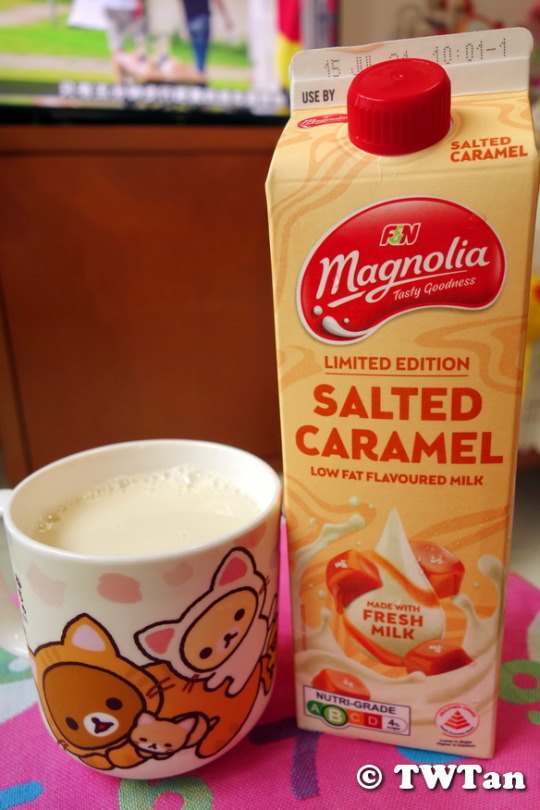#food and beverage production
Explore tagged Tumblr posts
Link
Formulation of herbal water with zero caloric sweeteners and natural colors and flavors. This case study focuses on:
Formulation of the herbal beverage that has good sensory properties
Extension of the shelf life of the product
#herbal water#herbal beverage#beverages#food and beverage#beverage development#nutrients#nutraceutical#nutraceutical formulation#beverage developers#beverage production#food and beverage production#new beverage products#beverage product
1 note
·
View note
Text
Newly launched, the Farmhouse White Chocolate Low Fat Flavoured Milk (S$3.73 per 946ml pack) brings a delicious and dreamy taste of winter wonderland to the tropical Singapore. Taking a sip, one can detect a whiff of vanilla-like white chocolate, complemented by the freshness of milk from Australia. Sis also bought the Cafe Latte Low Fat Coffee Flavoured Milk that is flavoured with Arabica coffee beans. The milk is thick with a nice fragrant of coffee plus it is low sugar and low fat to boot.



Paired the milk with a wedge of the White Lotus Seed Paste Mooncake with Egg Yolk (美心蛋黄白莲蓉月饼) from Hong Kong MX Mooncakes (香港美心月饼). Still left with one mooncake to slowly savour and then I have to wait for another year to enjoy it again.

Selected images courtesy of F&N Foods and here.
#Farmhouse#White Chocolate Milk#Cafe Latte Coffee Milk#Low Fat#Low Sugar#Australian Fresh Milk#New Product#Limited Edition#Hong Kong MX Mooncake#香港美心月饼#Mooncake#月饼#White Lotus Seed Paste#Salted Egg Yolk#Beverage#Dessert#Snack#Food#Buffetlicious
85 notes
·
View notes
Text
Food Product Compliance & Regulations Services | Expert Regulatory Solutions | MoveAhead
Ensure your food products meet industry standards with MoveAhead's. We provide food product compliance & regulations services in India. Navigate regulations and achieve compliance for successful market entry.

#food product compliance services in India#regulatory compliance for food and beverage#food industry compliance#food product regulations#food product compliance services
2 notes
·
View notes
Text
Food and Beverage Product Development Company
FUBIZO, the food and beverage product development company helps to enhance your food product from concept to manufacturing scale-up. Call now!
#entrepreneur#branding#marketing#startup#success#food#food product development#food and beverage consultant
2 notes
·
View notes
Text

Taste with health!
2day Mega Store: We make shopping simple
Get all your daily need essential under one roof and make your shopping easy and smart with 2Day Mega Store, one of the best supermarket at your nearby location, Kharkhuda-Haryana(131402). You will be provided all types of items from kitchen stuff to cosmetics and gym supplements as well. Hypermarket with best quality products and well managed staff for your comfort and safe shopping. Great discounts and big offers at weekend and special occasion are available at 2Day Megastore.
https://2daymegastore.com/
#2day Mega store#shopping place Kharkhoda#shopping place Sonipat#mega store Kharkhoda#foo and beverages#healthy food#healthy life#healthy lifestyle#gym supplements#fast home delivery#kitchen stuff#cosmetics products#skin care products#shopping point kharkhoda
2 notes
·
View notes
Text

#Food processing equipment manufactures pune#beverage processing equipment PCMC#Juice Processing Equipment Manufacturers Pune#Milk Processing Machinery Pune#Yoghurt Manufacturing Production Process
2 notes
·
View notes
Text
weird idiot brain: i can have a Hot Creamy Beverage today and it will not freak me out because i no longer fear my fear foods😌
also weird idiot brain: 🚨🚨🚨🚨🚨😳😳😱😱COUGH DROP 🤯🤯🤯😨😨🙀🙀🙀🫨🫨🚨🚨🚨🚨🚨
#who would win. six months of residential or one (1) ludens bag#it actually was the residential bc my throat hurts So Goddamn Much but like. it was close#ed tw#i got silly string where the brains supposed to be#i KNOW what hot creamy beverage sounds like also but i don’t know how else to describe that specific fear food niche it’s literally hot crea#creamy beverages!!!!!! hot beverage with milk or milk derived products or milk substitutes. there. now it doesn’t sound like i’m. never mind#however that one Was a concern for like a little while when i was at my worst and now im forever burdened with the knowledge of how many cal#calories are in a load…#nsft in tags#i’m just gonna stop talking now. i probably have a fever#aaaaaand post
2 notes
·
View notes
Text

Drink him
#art#collage#design#furniture#graphic design#illustration#infographic#painting#product design#sculpture#drinks#drink water#produk gafi diformulasikan oleh pakar drinking powder yang memiliki kandungan dari bahan kualitas terbaik dan halal serta aman dikonsumsi a#food and drink#beverage#tea#fruit#ice cream#desserts#i am drinking your milkshake
3 notes
·
View notes
Text
Algae Products Market to Reach $6.01 Billion by 2031
Meticulous Research®—a leading global market research company, published a research report titled ‘Algae Products Market Size, Share, Forecast, & Trends Analysis by Type (Hydrocolloids, Lipids, Carotenoids), Source (Seaweed, Microalgae {Chlorella, Spirulina}), Form (Dry, Liquid), Application (Food & Beverage, Nutraceuticals) - Global Forecast to 2031’.
According to this latest publication from Meticulous Research®, the algae products market is projected to reach $6.01 billion by 2031, at a CAGR of 7.9% from 2024 to 2031. The growth of the algae products market is driven by consumers’ increasing preference for algae-sourced products, the growth in vegetarianism, the rising demand for natural food colors, and the rapid growth of the nutraceuticals industry. However, complexities in algae production and low awareness regarding the benefits of algae restrain the growth of this market. Furthermore, the growing demand for biofuels is expected to generate growth opportunities for the players operating in this market. However, the risk of algae contamination is a major challenge impacting market growth.
Additionally, the increasing adoption of algae products is a prominent trend in the algae products market.
Key Players
The algae products market is characterized by a moderately competitive scenario due to the presence of many large- and small-sized global, regional, and local players. The key players operating in the algae products market are Algatechnologies Ltd. (A Part of Solabia Group) (Israel), BASF SE (Germany), BDI BioLife Science GmbH (Austria), Bluetec Naturals Co., Ltd (China), Cargill, Incorporated (U.S.), Cyanotech Corporation (U.S.), DIC Corporation (Japan), Lyxia Corporation (a subsidiary of Shenzhen Qianhai Xiaozao Technology Co., Ltd.)(U.S.), Seagrass Tech Private Limited (India), Tianjin Norland Biotech Co., Ltd. (China), Ingredion Incorporated (U.S.), HISPANAGAR S.A. (Spain), COMPAÑIA ESPAÑOLA DE ALGAS MARINAS S A (Spain), W Hydrocolloids, Inc. (Philippines), SNAP Natural & Alginate Products Pvt. Ltd. (India), and Harsha Enterprises (India).
The algae products market is segmented by type (hydrocolloids {carrageenan, alginate, agar, and other hydrocolloids}, algal protein, lipids, and carotenoids {astaxanthin, beta carotene, lutein, and other carotenoids}), by source (seaweed/macroalgae {red seaweed, brown seaweed, and green seaweed}, microalgae (spirulina, chlorella, Dunaliella salina, Haematococcus pluvialis, Nannochloropsis, and other sources), by form (dry and liquid), by application (food & beverage {food [dairy, bakery and confectionery, other food products], beverages}, nutraceuticals, cosmetics {skin care, hair care, other cosmetics products}, animal feed, and other applications), and geography (North America, Europe, Asia-Pacific, Latin America, the Middle East & Africa). The study also evaluates industry competitors and analyzes the regional and country-level markets.
Based on type, the algae products market is mainly segmented into hydrocolloids, algal proteins, lipids, and carotenoids. In 2024, the hydrocolloids segment is expected to account for the largest share of 51.1% of the global algae products market. The large market share of this segment can be attributed to factors such as the increasing consumption of seaweed-based products, the growing demand for biofuels, the rising demand for natural and plant-based ingredients, and the increasing demand for hydrocolloids from various industries.
Based on source, the algae products market is segmented into macroalgae/seaweed and microalgae. In 2024, the macroalgae/seaweed segment is expected to account for the larger share of 73.8% of the global algae products market. The large market share of this segment can be attributed to the abundant availability of seaweed as raw materials, driven by the increasing production of seaweed and growing awareness of the health benefits associated with seaweed products. Furthermore, the active components derived from seaweeds serve various purposes, acting as antioxidants, antibacterial and whitening agents, anti-aging solutions, and anti-acne treatments, contributing significantly to the growth of the seaweed products market.
Based on form, the global algae products market is segmented into dry and liquid. In 2024, the dry algae products segment is expected to account for the larger share of 72.1% of the global algae products market. The large market share of this segment is attributed to the longer shelf-life and ease of transportation and storage of dry algae products compared to liquid algae products and the increasing use of algae powder in the food, cosmetic, and feed industries.
Geographic Review
This research report analyzes major geographies and provides a comprehensive analysis of North America (the U.S. and Canada), Europe (Germany, France, U.K., Italy, Spain, and Rest of Europe), Asia-Pacific (China, Japan, India, South Korea, Australia, and Rest of Asia-Pacific), Latin America (Brazil, Mexico, Argentina, Chile, and Rest of Latin America), and the Middle East & Africa.
In 2024, Asia-Pacific is expected to account for the largest share of 39.2% of the global algae products market. Asia-Pacific algae products market is estimated to be worth USD 1.38 billion in 2024. The large share of this market is mainly attributed to the increasing demand for natural ingredients in the rapidly growing food and beverage, nutraceuticals, cosmetic, and animal feed industries. In addition, the presence of a large number of stakeholders engaged in providing algae products for these industries due to the availability of raw materials, favorable climatic conditions for algae production, and cheap labor availability supports the growth of this market. Several government initiatives to promote the cultivation and usage of algae in several industries and the growing demand for healthy food products are further expected to boost the Asia-Pacific algae products market.
Download Sample Report Here @ https://www.meticulousresearch.com/download-sample-report/cp_id=3579
Key Questions Answered in the Report:
What is the value of revenue generated by the algae products market?
At what rate is the global demand for algae products projected to grow for the next 5-7 years?
What is the historical market size and growth rate for the algae products market?
What are the major factors impacting the growth of this market at global and regional levels?
What are the major opportunities for existing players and new entrants in the market?
Which type, source, form, and application segments create major traction for the manufacturers in this market?
What are the key geographical trends in this market? Which regions/countries are expected to offer significant growth opportunities for the manufacturers operating in the algae products market?
Who are the major players in the algae products market? What are their specific product offerings in this market?
What recent developments have taken place in the algae products market? What impact have these strategic developments created on the market?
Contact Us: Meticulous Research® Email- [email protected] Contact Sales- +1-646-781-8004 Connect with us on LinkedIn- https://www.linkedin.com/company/meticulous-research Connect with us on Twitter- https://twitter.com/MeticulousR123
#Algae Products Market#Algae products#algae food products#hydrocolloids#lipids#dry#carotenoids#protein#algae#spirulina#cosmetics#nutraceuticals#food & beverages
0 notes
Text
Backward Traceability: An All-time Challenge of Indian Dairy Industry

Traceability of any product is nothing but ability to track every aspect of manufacturing and distributing a product. In case of food and beverage, it becomes critical to trace the product from “Grass to Glass” or “farm to fork” . Traceability is extremely important in case of any crisis like withdrawal, recall, and identifying the root cause of any issues raised by customer / consumer / regulatory bodies . In India, FSSAI mandates an end to end traceability of all food products .
There are 2 types of traceability, Forward and Backward. Forward traceability is ability to trace the forward movement of that product (after manufacturing) in supply chain, mainly in warehousing, transportation, and further distribution till retailors . Backward traceability is tracing the backward manufacturing/ processing aspect like all steps of processing, used raw materials , packaging materials , process aids etc. Read More.....
#Indian Dairy products#Indian Dairy Industry#dairy products#fmt magazine#food and beverages#food and drinks
1 note
·
View note
Link
The global raw sugar market is expected to rise at a 4.6% Compound Annual Growth Rate (CAGR) from 2022 to 2032, as conducted by industry and market research on raw sugar. Food Research Lab aims to assist food and beverage industries in creating new food products that incorporate raw cane sugar instead of refined sugar.
#global research#market analysis#Organic Raw Cane Sugar#organic raw sugar#raw cane#raw cane sugar#unrefined sugar#food#food products#food research#foodresearchlab#food research and development companies#food industries#beverage industries#food and beverage
1 note
·
View note
Text
Magnolia had recently launched a new limited edition Salted Caramel Low Fat Milk so naturally we bought a carton to taste. It’s now available at NTUC for S$3.63, but you can get two for S$6.55 till 1 July 2024. Pouring myself a cup, the colour is off white or a very light shade of eggshell white if you asked me. Considering it tasted sweet, I am amazed that it got a Nutri-Grade B. The savouriness from the salted caramel isn’t as pronounced, coming in as an aftertaste with the unmissable warm and rich caramel filling the mouth.

#Salted Caramel Milk#Low Fat Milk#Fresh Milk#F&N#Magnolia#Limited Time Promotion#New Product#Chilled#Healthy Logo#Sweet#Savoury#Beverage#Food#Buffetlicious
59 notes
·
View notes
Text
Consumers Demand Transparency on AI in Food and Beverage Products

A survey found that a significant majority of respondents, 83%, agree that involvement of AI in food and beverage products should be clearly stated on labels, if a product has been made with the assistance of artificial intelligence. Most consumers believe that food and beverage manufacturers should declare if a product has been made with the assistance of artificial intelligence (AI), new research shows. ...READ MORE
Also Read: How Automation and AI are Shaping the Future of Meat and Protein Processing Industry
Also Read: Demystifying Industry Jargon: AI and Beyond
#artificial intelligence#food industry#food and beverages#food & beverages#food production#food processing#food and drink#food products
0 notes
Text

2Day Mega Store, we make shopping simple
Larger grocery stores, also known as supermarkets, can carry non-food products, such as clothing and household items due to the immense amount of space they occupy and their large profit allowing them to reach a more diverse consumer market, also allowing for consumers to find all their needs in one area. Depending on their geographic concentration, grocery stores will vary in size and products they will carry to fit and satisfy their consumer’s needs.
#2Day Megastore#shopping place#supermarket#mini market#food and beverages#free delivery#grocery store#food products#cosmetics#makeup products#shopping mall in Kharkhuda#packed food
4 notes
·
View notes
Text
Exploring the Market Potential of JKUAT’s Watermelon Wine and Other Fruit Products
The Jomo Kenyatta University of Agriculture and Technology (JKUAT) in Kenya, which has been researching the production of wine from fruits such as cactuses, bananas and pineapples, will sharpen its focus on the commercialisation of its existing watermelon wine in 2025. In addition to its watermelon wine, JKUAT’s Food Technology Centre has been developing products such as yoghurts, fruit and…
#agro-processing in Kenya#food waste solutions#fruit preservation#fruit wines in Kenya#fruit-based wine#innovative beverages#JKUAT#JKUAT Food Technology Centre#JKUAT research#Kenyan agriculture innovations#Kenyan agro-technology#Kenyan wine industry#post-harvest losses#tropical fruit wines#value addition in agriculture#watermelon wine#watermelon wine alcohol content#watermelon wine commercialization#watermelon wine retail price#wine production in Kenya
0 notes
Text
How to Manage Tobacco Inventory for Maximum Efficiency
Tobacco sales in the U.S. brought in over $90 billion in 2021, according to the National Institutes of Health (NIH). That's a big market!
But if you own a tobacco or convenience store (C-store), you already know how tricky it can be to keep your shelves stocked just right. Have you ever been stuck with too much inventory or lost sales because of empty shelves?
You must partner with a leading wholesale tobacco distributor in your location now! But that's not the only solution to follow! Here are some more practical ways to solve these problems and achieve efficiency while managing tobacco inventory.

Issues with Tobacco Inventory Management
Managing tobacco inventory can feel like juggling—there's much to keep track of. For starters, there are strict rules to follow. Tax stamps, age restrictions, and other regulations can be a headache. Slip-ups can cost you fines or even your license.
Demand is another challenge. Cigarette sales might be steady, but cigars, vapes, and chewing tobacco can be unpredictable. If you overstock, you tie up money and risk products going stale. But if you run out, you're losing sales and frustrating customers.
And let's not forget theft. Tobacco products are small, valuable, and, unfortunately, a common target for shoplifters. It's hard to stay on top of these issues without a good system in place.
Ways to Manage Tobacco Inventory for Maximum Efficiency
If managing inventory feels overwhelming, don't worry. These tips can help make the process easier and more efficient:
1. Use Technology to Streamline Operations
A reliable POS system simplifies inventory tracking by automatically updating stock levels, processing sales, and generating reports. It also helps with customer loyalty programs, enhancing the shopping experience and driving repeat business.
The technology can alert you when stocks run low and optimize your ordering process, saving time and reducing human error. Leveraging technology allows you to focus on growing your business while the system manages the day-to-day tasks.
2. Work with a Trusted Distributor
Partnering with a dependable distributor ensures access to quality products and consistent restocking. Reliable distributors offer competitive pricing, up-to-date market trends, and quick delivery, which reduces the chances of running out of stock or overordering.
This helps you maintain a balanced inventory and stay ahead of consumer demand. By building strong relationships with your suppliers, you can address issues before they affect your business operations, improving overall efficiency.
3. Leverage Sales Data to Forecast Demand
Analyzing past sales can help you anticipate future demand for your products. Seasonal trends, holidays, and customer preferences majorly affect product performance. Using your POS system's analytics tools, track which items sell the fastest and when to reorder.
Forecasting demand ensures you don't overstock or run out of popular items. Understanding these patterns helps you optimize your inventory, prevent wasted space, and meet customer expectations at all times.
4. Maintain an Organized Inventory
An organized inventory system is key to ensuring efficient stock management. Group similar products together and label them clearly for quick identification. Keep your bestsellers within easy reach to avoid unnecessary search time.
Wholesale cigarette distributors can be of great help in this context as they let you impelement barcode scanning technology to automate tracking and streamline inventory checks. Regularly updating your inventory and maintaining a clean, organized stock area will minimize errors, prevent misplaced products, and help staff locate items faster, reducing frustration and boosting productivity.
5. Secure Your Inventory
Given the high value of tobacco products, securing your inventory is crucial. Install security cameras and lock sensitive or high-value items in secure storage areas to deter theft. Regularly monitor stock levels and cross-check them with your inventory system. Implementing a POS system with discrepancy alerts ensures you can detect and resolve issues quickly. These precautions protect your assets and help you maintain accurate records, prevent losses, and foster a safe shopping environment for customers.
6. Train Your Team for Success
A well-trained team is crucial for effective inventory management. Ensure employees are knowledgeable about tracking stock levels and following procedures for stocking and replenishing. Regular training sessions will keep your team updated on best practices and product knowledge.
When staff are skilled in inventory management, they can identify issues early, reduce errors, and enhance operational efficiency. Additionally, partnering with a wholesale distribution provider can streamline inventory processes and optimize your supply chain management, further improving your business's overall performance.
7. Perform Regular Inventory Counts
Frequent inventory counts, known as cycle counting, help you catch discrepancies early without interrupting your daily operations. Schedule smaller, more regular checks instead of waiting for an annual audit. This allows you to identify issues quickly, such as misplaced items or stock discrepancies, and take corrective action before they become larger problems. Frequent counts ensure that your inventory records remain accurate, reduce errors, and keep your business running smoothly, helping you maintain control over stock levels at all times.
A Better Way to Manage Your Tobacco Stock
Running a tobacco store can be tough, but you don’t have to do it alone. Atlantic Dominion Distributors has been helping stores like yours for years. We'll make sure you have the right products at the right time, so you can focus on keeping your customers happy.
From competitive prices to expert advice, we’ve got your back. Let us help you streamline your inventory and keep your shelves stocked with what your customers want most.
Ready to get started? Contact Atlantic Dominion Distributors today, and let’s work together to make your store even better.
#chewing tobacco products wholesale#wholesale tobacco distributors#wholesale cigarettes distributors#atlantic dominion distributors#wholesale food distributors#beverage distributors
0 notes